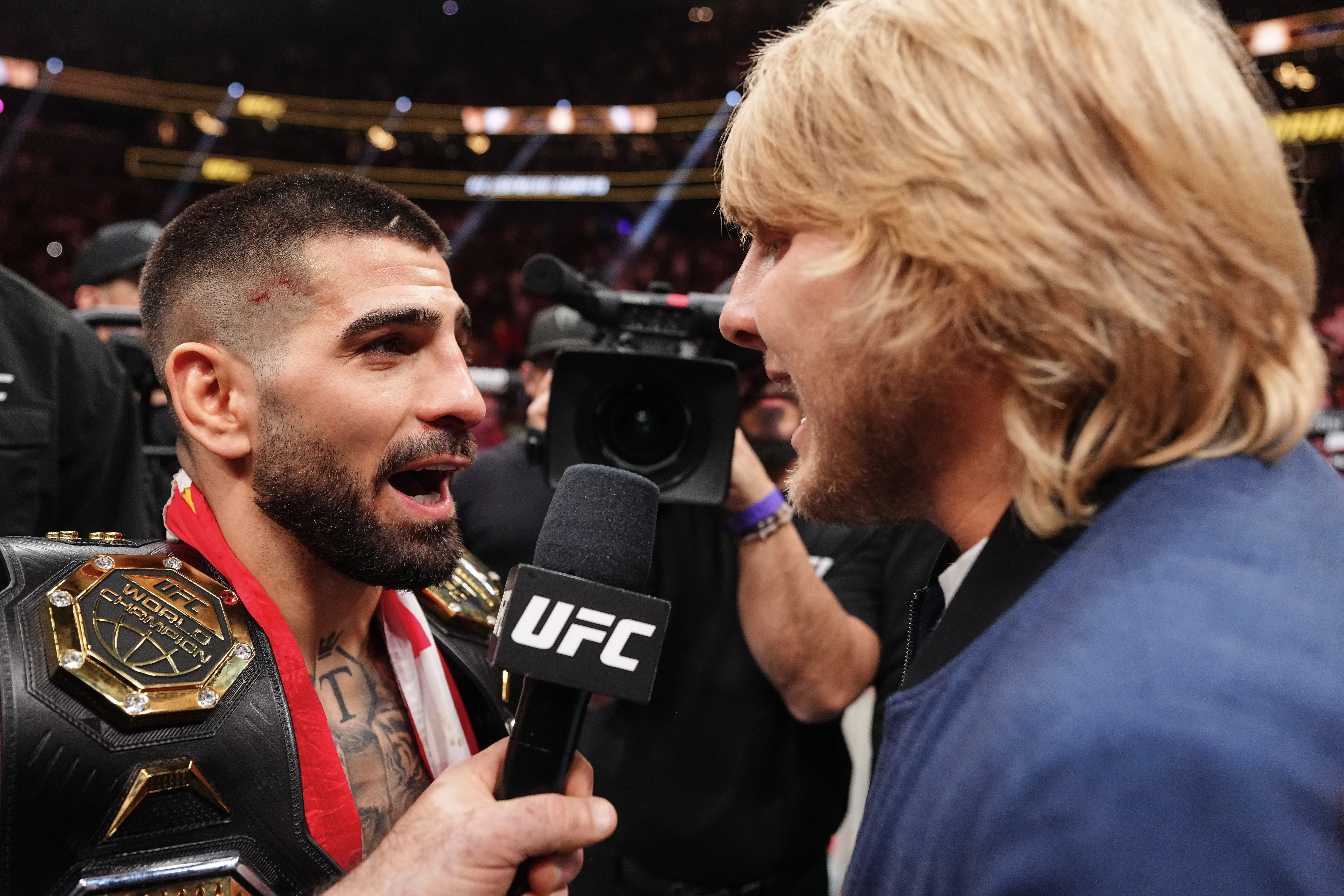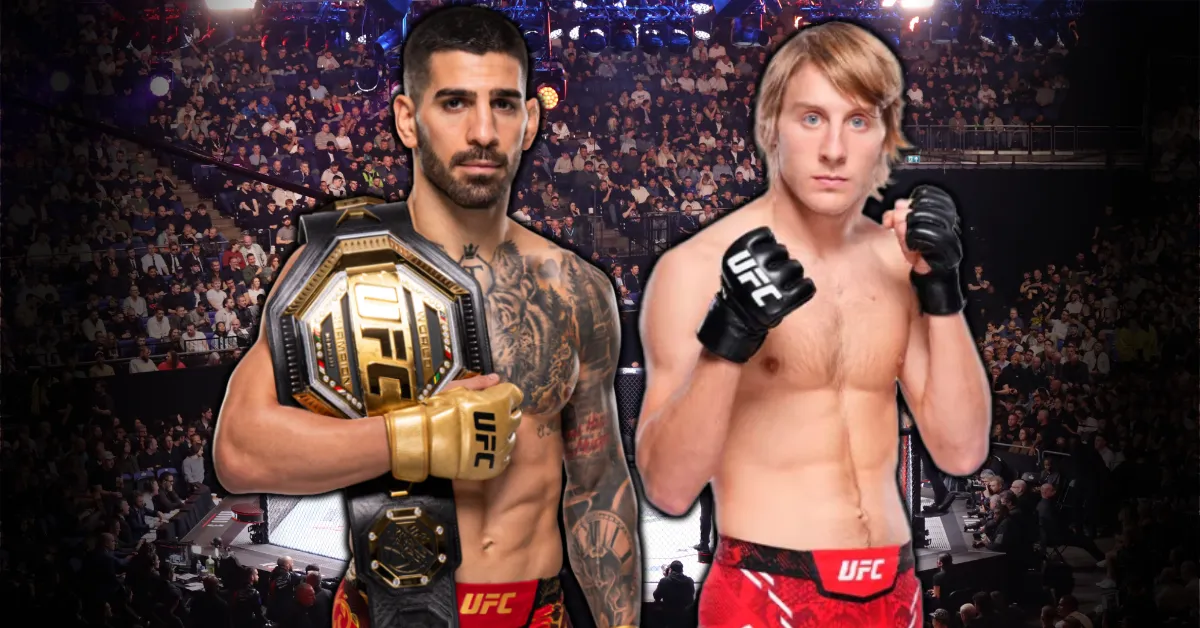From the moment Paddy Pimblett stepped under the bright lights and into the unforgiving glare of global attention, his voice has carried the same mixture of bravado and raw belief that turns ordinary fights into cultural moments. Now, as the countdown to the Bernabéu showdown begins, that voice has hardened into a declaration so stark it demands to be heard. Paddy Pimblett did not whisper his threat — he issued it with the kind of conviction that reverberates long after the microphones are turned off: “I’ll knock him out in front of 90,000!” This is more than a pre-fight line. It is a dare, a promise, and a psychological jolt aimed straight at Ilia Topuria and anyone who doubts the magnitude of what’s about to unfold.

The build-up and the stakes
A fight at the Bernabéu is never just a sporting contest. It is theater, pageantry, and an opportunity to make history. For Paddy Pimblett, who has always thrived on the electric intersection of charisma and combat, this is his moment to prove he belongs not only in the conversation but at the very top of it. The stakes could not be higher for Ilia Topuria, a formidable opponent whose skill set and quiet ferocity have earned him the respect of fans and fighters alike. The clash in Madrid will test everything both men have spent their careers building: technical proficiency, heart, and the capacity to handle pressure when the entire arena is focused on a single strike.
Pimblett’s words are calculated. To claim he will knock out Ilia Topuria in front of 90,000 does more than excite ticket sales and social media algorithms. It sets a mental battlefield. In combat sports, the mind is sometimes as decisive as the body. A single, vivid claim can change the arc of a fight before a fist even flies. Fans who love spectacle will flock to the Bernabéu because they want to see whether bold talk translates into a moment of irreversible drama. Fighters who value legacy will watch because the narrative will forever mark the winner. And for Ilia Topuria, the warning is an unblinking indicator that this is a man who believes, without reservation, that the knockout is not only possible but inevitable.
How bravado becomes strategy
It is easy to dismiss hyperbole as mere publicity. But when a fighter like Paddy Pimblett repeats a line — when he makes a statement that is both precise and public — it becomes a piece of strategic theater. The proclamation of a knockout in front of 90,000 does three things at once. First, it shifts the spotlight toward the physical spectacle, heightening expectations and press coverage. Second, it plants a seed in the mind of Ilia Topuria: the idea that his opponent expects, plans, and is counting on a single, definitive outcome. Third, it frames the encounter in a binary way: will Pimblett’s bravado be vindicated, or will Topuria use it as fuel to dismantle that narrative?
A fight often plays out in the space between what is said and what is delivered. Fighters are practitioners of controlled violence, and part of their training is learning to harness psychological moments. For Pimblett, the chant of “I’ll knock him out” is a confidence ritual turned outward. It invites reaction, tests composure, and can provoke mistakes. Opponents who react emotionally to such a claim may deviate from their game plan, opening themselves to the kind of opening a knockout artist seeks. Conversely, a composed response from Ilia Topuria could mean the buildup works against Pimblett by making him predictable.
The technical matchup: power vs precision
To understand whether Paddy Pimblett’s warning is realistic, one must examine the technical components of both fighters. Pimblett carries an intoxicating mix of power and unpredictability. He often uses the rhythm of a fight to lull opponents into complacency, then explodes with a strike that capitalizes on timing rather than pure force alone. That signature style makes the knockout threat credible. A well-placed counter, a perfectly timed entry, or a fed-up opponent losing balance are all vectors where Pimblett’s finishing instincts shine. His capacity to create momentum in the octagon gives weight to his words.
Facing him is Ilia Topuria, a man whose fighting style is the product of meticulous technique and a calm, measured approach. Topuria’s ability to stay composed under pressure and dismantle emotions with methodical offense is well known. He is less about showmanship and more about surgical efficiency. Where Pimblett might seek a crowd-pleasing finish, Topuria often searches for control and the methodical accumulation of advantage. This dynamic — showman versus technician — is where the Bernabéu spectacle will live or die. If Paddy Pimblett can unsettle Ilia Topuria enough to create openings, the knockout claim becomes entirely plausible. If Topuria maintains composure and imposes his technical will, Pimblett might find his bravado running up against a brick wall of discipline.
The crowd as a weapon
There is an intangible yet undeniable truth about arena fights: the crowd is a force multiplier. Twenty cheering fans are not the same as 90,000 roaring until their throats are raw. For Paddy Pimblett, who feeds off noise and spectacle, the Bernabéu crowd is a gladiatorial adrenaline reservoir. Bold proclamations like “I’ll knock him out in front of 90,000!” are designed to unify spectators into a tidal wave of support. It becomes an amplifier for every feint, every jab, every explosion of motion. The crowd’s energy can awaken something more primal in a fighter — a willingness to press, to take a chance, to chase the spectacular finish that validates the pre-fight talk.
Yet crowds can also be deceptive. The roar that has the power to lift a fighter can also turn into a crushing wave when momentum shifts. A fighter who senses the energy tilting may press harder, desperate to reclaim the moment, and that desperation can lead to openings. That dual nature is what makes Pimblett’s prediction a high-risk, high-reward maneuver: if the noise goes his way, the imagined knockout becomes a real possibility. If it goes against him, the same intensity might expose him.
Narrative and legacy
Combat sports are storytelling machines. Every proclamation, every stare-down, and every headline is a chapter in two careers. Paddy Pimblett’s threat at the Bernabéu is a claim about legacy as much as it is about fight night. To promise a knockout in front of 90,000 is to stake a place in the sport’s memory. The utterance is a bid to be remembered not as just another loudmouth, but as the man who delivered the impossible with theatrical finality.
Ilia Topuria, for his part, stands at a crossroads. A victory over Pimblett would not only derail the narrative but would reposition him as the unshakeable technician who can silence the talk and make it meaningless. If Topuria wins in dominant fashion, the pre-fight bravado becomes a footnote in a larger story of discipline prevailing. If he loses and the knockout happens as Pimblett promised, Topuria’s career will be altered in the most public way possible.
What to expect on fight night
Expect tension thicker than any trainer’s towel. Expect performances calibrated for the camera and for the crowd. Expect the kind of tactical chess that becomes explosive in sudden bursts. Where the fight finds its decisive moment will hinge on tempo and temperament. Paddy Pimblett will search for openings by dancing through range and inviting exchanges that favour explosiveness. Ilia Topuria will seek the inverse: to slow the rhythm, to methodically collect advantages, and to frustrate the showman’s search for the moment that ends everything.
Fight night at the Bernabéu will likely unfold in phases of electric possibility followed by moments of clinical resetting. Analysts will point to small mistakes, to the swing of a hip, or to the fraction of a second a guard drops. For fans, it will feel like watching narrative and reality collide. When Paddy Pimblett shouted the words about knocking out Ilia Topuria in front of 90,000, he did not simply create a headline. He created a lens through which every punch, every step, every pause on that night will be viewed.

The final thought
Bold statements are the lifeblood of combat sports. They inflame, inspire, and incite. Paddy Pimblett’s chilling warning to Ilia Topuria is as much psychological warfare as it is promotion. Whether it becomes prophecy or hubris will depend on an art that fighters have practiced their whole lives: converting intention into action under the pressure of a crowd and the scrutinizing world. On fight night at the Bernabéu, the echo of those words will hang over the cage like a challenge. The world will watch not just to see who wins, but to see whether a promise made in heat and confidence can be fulfilled under the greatest pressure.
The bravado, the theatre, the technical duel, and the massive crowd will combine to create a night that will be talked about for years. Paddy Pimblett’s declaration that he will knock out Ilia Topuria in front of 90,000 was not made lightly. It is a gauntlet thrown, a story invited, and a test of whether words can become history.